Introduction
Music theory might seem complex at first, but the right book can make learning easy and fun! Whether you’re picking up an instrument for the first time or want to understand how music works, having a solid foundation in music theory is key. The best way to start? With the best music theory books for beginners that explain concepts clearly and guide you step by step. As the famous composer Leonard Bernstein once said, “To achieve great things, two things are needed: a plan and not quite enough time.” So, let’s not waste time—here are the best books to help you start mastering music theory today!
ALSO: Top 18 Must-read books for Musicians
What Makes a Great Music Theory Book for Beginners?
Before diving into our list, let’s look at what makes a beginner-friendly music theory book worth your time:
- Clear Explanations – Concepts should be easy to understand, with step-by-step breakdowns.
- Engaging Format – Diagrams, exercises, and illustrations help make learning interactive.
- Progressive Learning – A book should start with the basics and gradually introduce more advanced concepts.
- Practical Applications – Theories should be connected to real-world music and instruments.
- Exercises & Ear Training – Practical exercises reinforce learning and build a stronger musical ear.
Now, let’s explore the best music theory books for beginners that check all these boxes!
Best Beginner-Friendly Music Theory Books
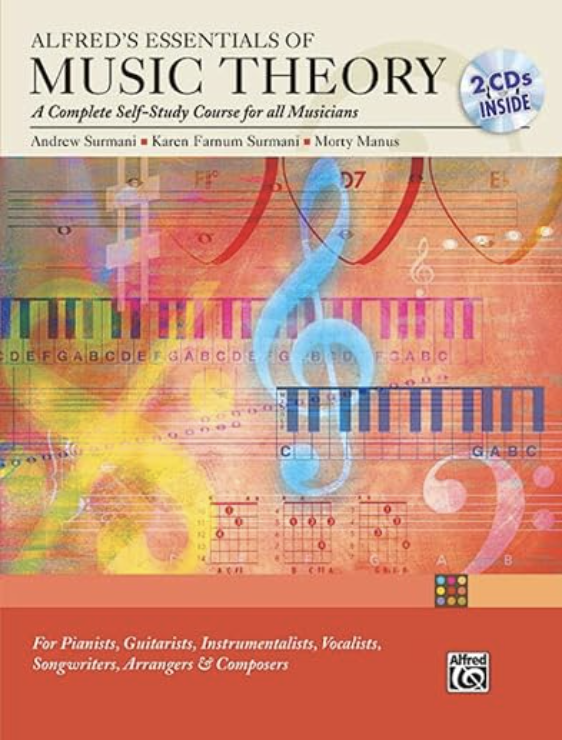
Alfred’s Essentials of Music Theory (Buy here)
One of the most comprehensive yet beginner-friendly books available, Alfred’s Essentials of Music Theory covers notation, key signatures, scales, chords, and rhythm in an easy-to-follow format. The book includes exercises and comes with an optional interactive software that enhances learning through audio examples and tests. It’s perfect for those who prefer structured, step-by-step learning and want a workbook-style approach. Highly recommended for self-learners and students alike!
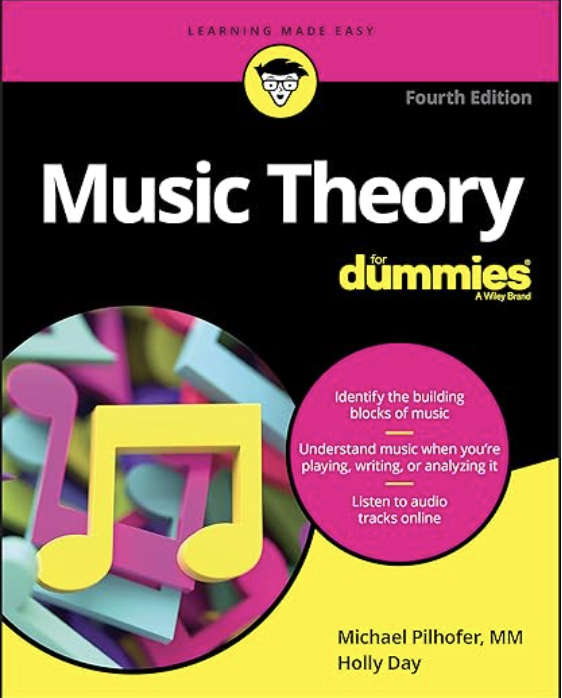
Music Theory for Dummies by Michael Pilhofer & Holly Day (Buy here)
This book is great for absolute beginners because of its lighthearted, engaging writing style. It covers the basics of rhythm, scales, keys, intervals, and chords in an easy-to-digest manner. With fun illustrations and real-world examples, it explains how music theory applies to different instruments and styles. It also includes online audio tracks, allowing you to hear concepts in action. If you’re looking for a fun and non-intimidating introduction to music theory, this book is a great choice.
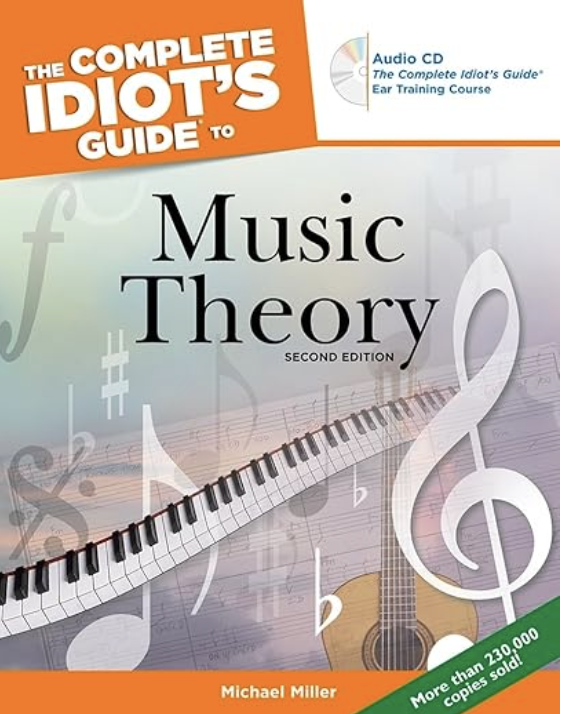
The Complete Idiot’s Guide to Music Theory by Michael Miller (Buy here)
A humorous yet informative guide, this book simplifies complex music theory concepts without overwhelming the reader. It covers fundamental topics like notation, harmony, rhythm, and composition, all while maintaining a conversational tone. One standout feature is how it relates music theory to practical playing, making it ideal for those who want to apply what they learn to an instrument. If you appreciate a relaxed, no-pressure approach, this is a great book to start with.
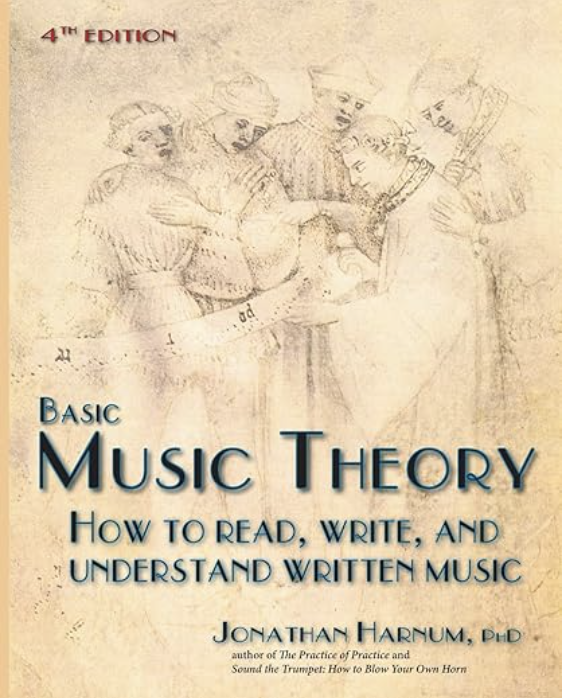
Basic Music Theory: How to Read, Write, and Understand Written Music by Jonathan Harnum (Buy here)
A well-structured and engaging book, this one focuses on the fundamentals of notation, reading sheet music, and rhythm. It’s particularly useful for those who want a self-paced learning experience. The book includes quizzes and exercises to reinforce learning, plus ear training exercises that help improve musical listening skills. If you’re serious about understanding written music, this book provides a solid foundation without feeling too academic.
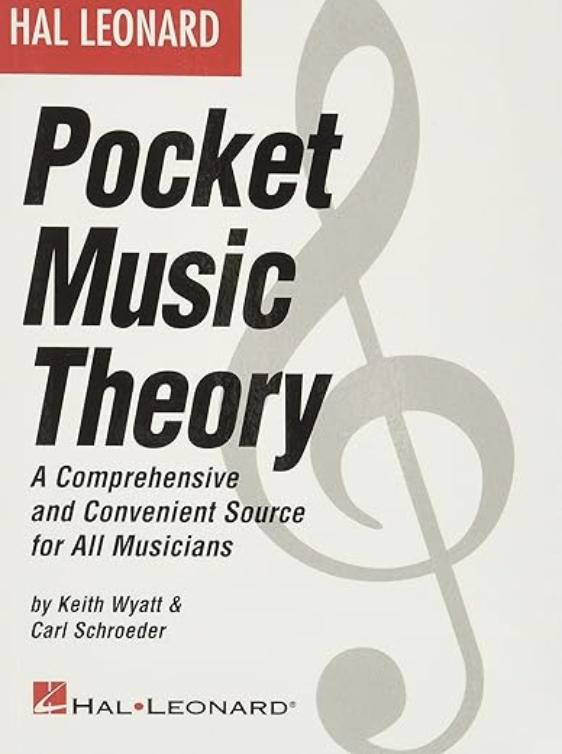
Hal Leonard Pocket Music Theory: A Comprehensive and Convenient Source for All Musicians (Buy here)
This compact yet informative book is perfect for beginners who want a quick reference guide to music theory. It explains scales, chord construction, and key signatures in an easy-to-follow manner. The concise format makes it a great choice for musicians on the go, whether you’re learning piano, guitar, or another instrument. If you’re looking for a handy reference book you can carry around, this is a great option.
Additional Resources for Learning Music Theory
Besides books, there are several other ways to improve your music theory skills:
- Online Courses – Websites like Coursera, Udemy, and Skillshare offer structured music theory lessons.
- YouTube Channels – Free resources like Rick Beato, MusicTheory.net, and Andrew Huang provide visual explanations of key concepts.
- Apps for Learning Music Theory – Try apps like Tenuto, Perfect Ear, and Musica for interactive learning.
- Workbooks & Practice Sheets – Reinforce your learning with music theory exercise books that offer quizzes and written exercises.
Conclusion
Learning music theory is one of the best ways to improve your musicianship. Whether you’re picking up an instrument, composing, or just curious about how music works, the best music theory books for beginners will provide the foundation you need. Books like Alfred’s Essentials of Music Theory, Music Theory for Dummies, and Basic Music Theory by Jonathan Harnum make learning enjoyable and accessible.
Start with a book that matches your learning style, and remember—practice is key! Dive in, explore, and develop your understanding of music theory today.





